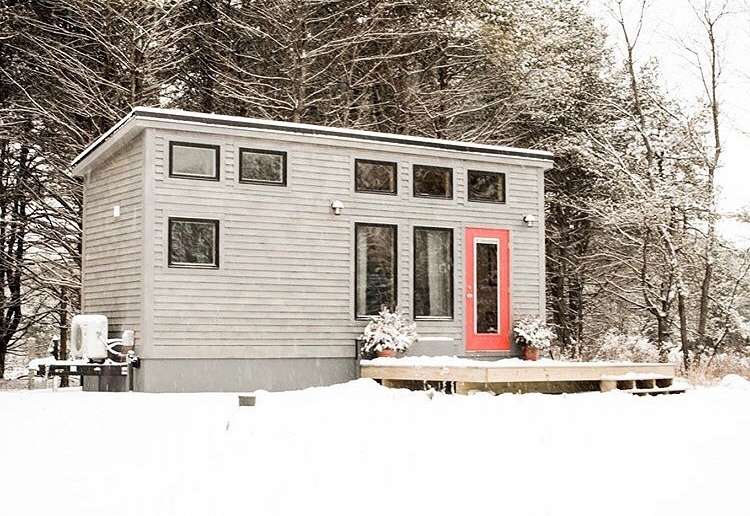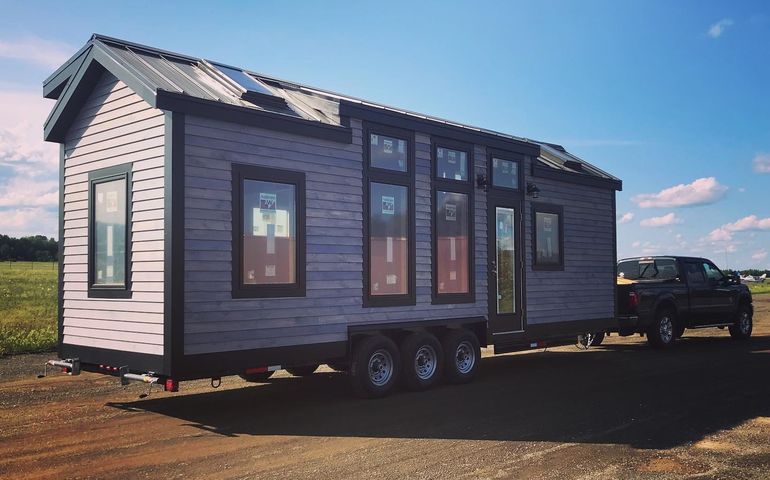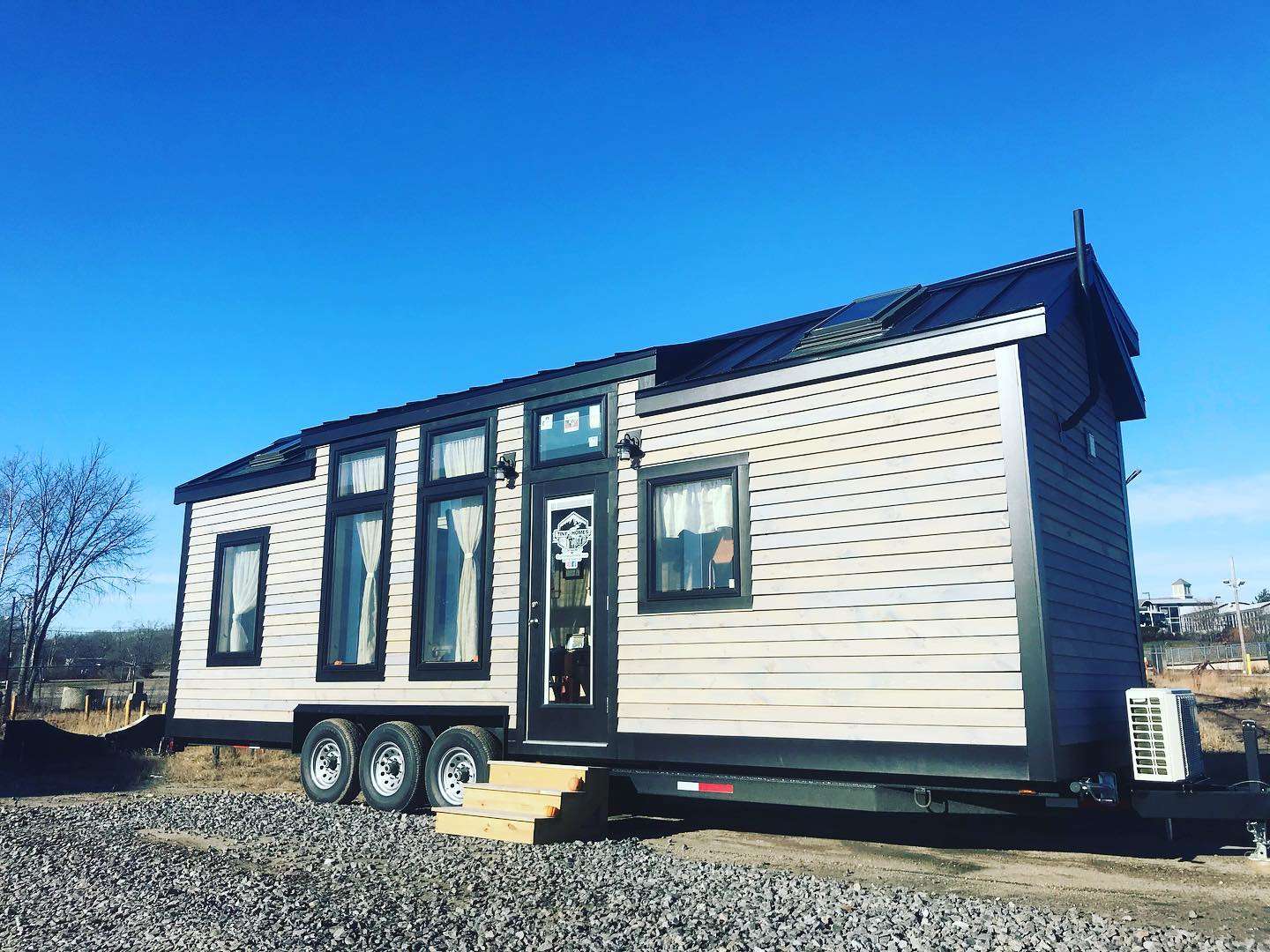
Tiny homes legislation may unblock development bottleneck
 Courtesy / Tiny Homes of Maine
The Allagash, built by Tiny Homes of Maine, is an 8-by-30-foot dwelling on a steel chassis. The homes are built to be moved between locations, which is a sticking point when it comes to regulating them in Maine.
Courtesy / Tiny Homes of Maine
The Allagash, built by Tiny Homes of Maine, is an 8-by-30-foot dwelling on a steel chassis. The homes are built to be moved between locations, which is a sticking point when it comes to regulating them in Maine.
In 2016, Corinne Watson, at the time an electrical engineer with IDEXX Laboratories, decided to pursue a dream — building tiny homes. The new path not only would give her a fulfilling career, but she hoped to also help make a small dent in Maine's affordable housing crisis.
"I'm disgusted that our society allows people to sleep outside [rather than provide housing for them]," she told Mainebiz this week. "I wanted to show my kids we could do something, take matters into my own hands." The homes, which are on a steel chassis and can be easily moved as a resident's needs change, seemed like a good way to provide low-cost or transitional housing.
Because the homes, which are under 400 square feet, sit on the chassis, they don't come under state housing code and are too small to be regulated as mobile homes. There was also no clear way for potential owners who didn't have cash to get financing.
After working with the state on it for a year, Watson and the Bureau of Motor Vehicles came up with a solution. The homes were regulated as camp trailers, much as recreational vehicles are regulated. This allowed buyers to get an RV loan, which is traditionally 10% down and a 10-year payoff, with support from Gorham Savings Bank and United Insurance.
"And away we went," Watson, who quit her job in 2018 to run Tiny Homes of Maine.
Towns and cities, too, were an issue. While a rulemaking change proposed in 2017 by state Rep. Seth Berry, D-Bowdoinham, defined tiny homes in the Maine Uniform Building Code as a dwelling 400 square feet or under, it's up to municipalities to interpret. The chassis that actual tiny homes are on is still an issue. Many towns that address them as RVs have laws that an RV can't be used as a dwelling for more than 180 days.
Of Maine's 488 municipalities, only Chelsea has a law allowing the homes; only Portland has banned them. Everywhere else, it's up to the discretion of the town or city government, frequently falling to the code enforcement officer.
Initially, Watson saw a lot of resistance, but that was changing, too. "We were picking away at that, town by town."

'Good to go'
"We were good to go. We were designing tiny homes, building tiny homes, selling tiny homes," Watson said.
By June, Tiny Homes of Maine had sold 15 homes that were issued titles by the BMV. The company started in Windham where Watson and her husband, Thomas Small, live. Two years ago, they began constructing the homes in Houlton, near their hometown of Smyrna, where jobs were needed.
They also partnered with Portland Container Co. to help construct the startup's OpBox product.
Tiny Homes had 10 full and part-time employees and also had an impact on the southern Aroostook County economy, using a variety of Houlton-area subcontractors as well as local producers and suppliers. Plans had been approved for a construction of a new manufacturing plant at Houlton's industrial park, something expected to help shore up the local economy and tax base, said John McLaughlin, director of the Southern Aroostook Development Corp.
Besides building dwellings, including some sold for use as Airbnbs, the company also was accommodating custom requests, such as one that's used as a luxury restroom to rent out for weddings. She said a large number of customers who plan to use them for their living quarters are single women, many of them older, who have no other options.
That all skidded to a stop in late June. The Maine Secretary of State's office shut down the title agreement, citing safety concerns by the BMV, despite the work Watson had done with the department over a year to craft an agreement.
Good news, bad news
With no business coming in following the letter, Watson got to work looking for a legislative solution.
Last week, the state Committee on Transportation unanimously approved LD 1981, which defines the homes, and gave it an emergency preamble, which means the Legislature will consider it soon. It needs a two-thirds vote of both houses to become law.
But Watson isn't celebrating yet. The bill initially was simple. It states that its purpose is "to define, identify and outline areas of concern and language for possible legislation concerning 'Tiny Homes.'"
The definition offered was that the homes are an enclosed space permanently constructed on a frame or chassis, intended for separate independent living quarters and:
- May not move under its own motive power;
- Is not larger in any dimension than allowed by Title 29A regarding dimensions;
- May be transported on the highway by way license plate or transit permit
- Are defined as a "Tiny Home" on any titling document.
At the Feb. 6 committee meeting where the vote was taken, the bill was amended to split the definition between the structures that are built as non-living quarters — think the Thompson's Point warming hut or a luxury bathroom to be rented to wedding venues — and the ones that are lived in. The former would come under the camp trailer provision, the latter would require a new definition. The living quarters definition would likely no longer allow the tiny homes to be titled as RVs, therefore shredding the careful financing structure that Watson had worked out with banks.
"It gets frustrating," she said. "People keeping talking about what a complex problem it is, but it's actually simple. There are a whole host of regulations which we fall well within."
The new language passed by the committee hasn't been written or published yet by the state, and the Legislature wouldn't vote until that's ready.

Job creation, economic development
The tiny home industry in Maine is a small one, but poised to get bigger, supporters say, citing everything from opportunities for job creation to helping make a dent in the affordable housing crisis.
While there are other companies that build tiny homes, Watson's is the one in the state dedicated to building them on the problematic chassis, so they can be moved from one spot to another if someone's job situation changes, for instance. The most popular model, the 8-by-30-foot Allagash, sells for $76,000, but Watson said the company works with those who can't afford as much but need housing.
Scott Ferden, of SS CAD Design & Woodworking, in Penobscot, is also starting up a company, partnering with On the Road, a trailer building company in Warren, said Rep. Sherm Hutchins, R-District 131.
At a Jan. 30 hearing on the bill, out of 37 who spoke or submitted written testimony, 35 were in support. Its sponsors are a Republican, Rep. Patrick Corey of Windham, and a Democrat, Sen. Mike Carpenter of Houlton.
It has the official backing of groups that range from the conservative Maine Heritage Policy Center, which was an initial proposer, to GrowSmart Maine, the Entreprenurial Center of Maine, SCORE, MaineHousing, the state Department of Economic and Community Development, and a host of other economic development agencies.
Tiny Homes of Maine contributed $1.4 million to the regional economy by using local suppliers for good and services, "Then — poof! — it's gone," Corey told the committee Jan. 30.
Others stressed the jobs it provided.
"While 10 jobs doesn't seem like a lot when compared to 100 or more jobs created at a production facility in southern Maine, it is a big deal in rural Maine and Houlton's no exception," McLaughlin, of Southern Aroostook Development Corp., told the committee. He said the jobs, too, fit in with the skill set of the southern Aroostook workforce.
Scott Dionne, of S.W. Collins, said that Tiny Homes of Maine has been a customer of the lumber and building supplies company's Houlton store. "Many of the products [Watson] uses, from the pine clapboard siding, spruce studs, ZIP System and AdvanTech sheathings by JM Huber, and even the heavy-duty trailers on which she builds her homes, come from manufacturers in our state. Further, her business provides direct, reliable employment for local tradespeople in northern Maine."
Homelessness solution
Providing affordable housing is also something supporters stress.
Armella Brown told the committee she's paying less for her tiny home, through an RV loan from Gorham Savings, than she would on a one-bedroom apartment. A Maine native, she moved back to the area from Boston because she was living paycheck to paycheck because of the high cost of living and her student loans.
"I was surprised to find I wouldn't fare much better with the cost of rent in the greater Portland area," she said. With her tiny house, which she closed on shortly before the secretary of state's ruling in June, "I would be paying off something that I owned, building equity and not paying money to a landlord every month that I would never see again." She added that if the state wants to attract more young people, it should make the tiny home market more accessible.
"I, a single female in my late 20s, was approved for a loan to purchase my own home. This is something that I am very proud of," she said. The only time she moves the home is when a town makes her. It's now on her parents' property in West Baldwin.
The bill also had the support of agencies that are looking for affordable housing solutions.
Peter Merrill, of MaineHousing, told the committee, "While our primary interest is in permanent housing, we also think there is a role for mobile tiny houses. As important, we have an interest in seeing a viable, local tiny house manufacturing presence in Maine."
Nancy Smith, of GrowSmart Maine, said, "We support policies, programs and projects that define and protect the value of our unique built and natural places while supporting long term economic opportunity. In our efforts to support economic prosperity throughout the state, we believe that the advent of tiny houses provides a creative, affordable, and comfortable niche within the range of housing choices needed throughout the state."
Safety concerns
The Bureau of Motor Vehicles withdrew its registration allowance because it was getting an increasing number of requests, and the department had to look more carefully at it, Stephen Ashcroft, director of vehicle services of BMV, told the committee.
While there weren't any specific safety complaints, and he lauded the homes Watson's company builds, the department is afraid the law would open up the floodgates to more questionable products.
But supporters said the trailers and other aspects are regulated, in some cases more than trailers that haul bigger and heavier items.
Hutchins, speaking for homebuilder Fernden, said the trailers are built to be safe and roadworthy. "The tiny houses are permanently attached to trailers so they can be moved as many times as required," Hutchins said. (Fernden, who had a recent medical procedure, couldn't be at the committee hearing.) Hutchins said the undercarriages must conform to safety regulations for strength, brakes and roadworthiness.
Another area of concern is how tiny house owners would pay property taxes. Legislators involved in the issue plan to recommend a committee to study further issues and see if legislation that works can be formulated.
Meanwhile, Watson and Small, who left his full-time job the week before the secretary of state's letter was issued, are running the business on their savings.
Watson said she plans to keep running Tiny Homes of Maine as best she can. "I'm going to take a breath and see what the next move is," she said. She's not ready to give up, despite the effort of the last year to get her product accepted. "I'm a pretty persistent person."
The fact the housing crisis is not easing up gives her a sense of urgency. "People are trying to figure out their housing situation. I get calls every day, and I tell them I'm trying to help," she said.
"It's frustrating, because it's not hard," she added. "Other states have figured it out. It's not a complex problem."
Mainebiz web partners
What can regular people do to move this legislation along? I am all in favor of this and would love for Maine to be one of the states that supports this type of housing! There are so many people, young and old who need something like this. Thanks for all you're doing, Corinne!
The biggest obstacle to progress and helping people is government regulations. Each group must have control no matter what. We must look at housing as shelter and not an ever increasing in value investment The investment attitude is what causes market bubbles than crashes. Let people have a place to shelter.










2 Comments